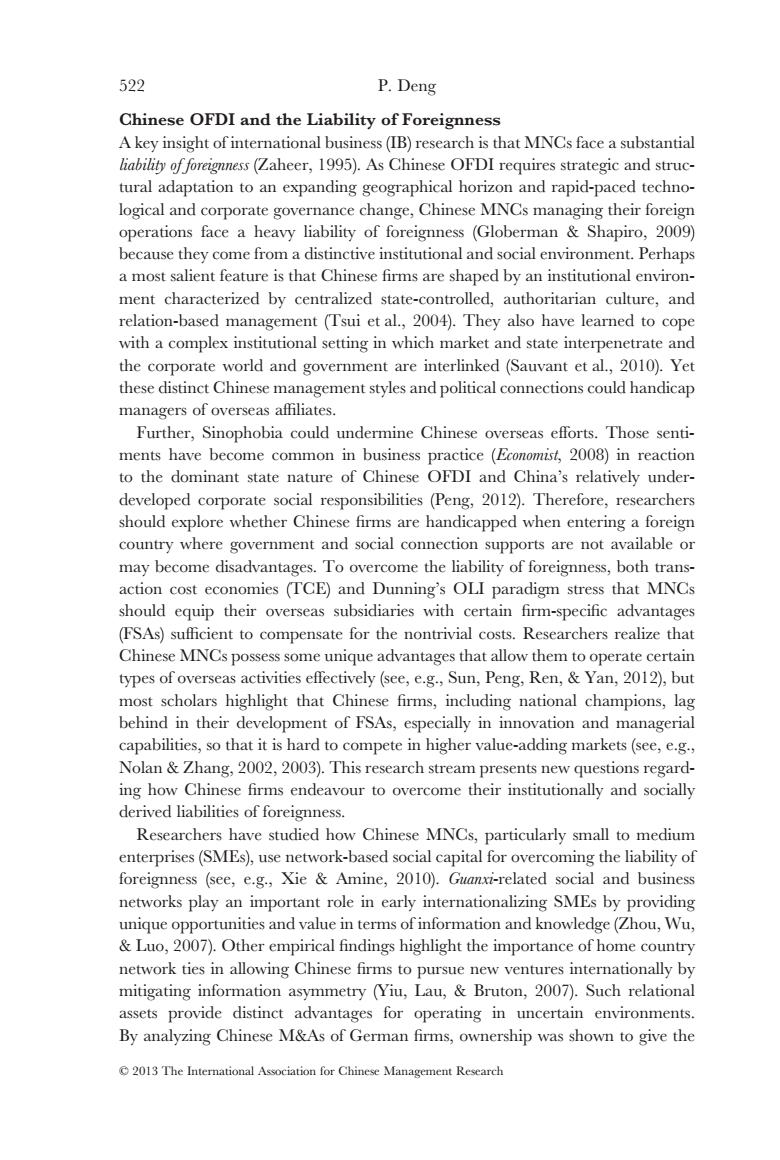正在加载图片...

522 P.Deng Chinese OFDI and the Liability of Foreignness A key insight of international business(IB)research is that MNCs face a substantial liability of foreignness(Zaheer,1995).As Chinese OFDI requires strategic and struc- tural adaptation to an expanding geographical horizon and rapid-paced techno logical and corporate governance change,Chinese MNCs managing their foreign operations face a heavy liability of foreignness (Globerman Shapiro,2009) because they come from a distinctive institutional and social environment.Perhaps a most salient feature is that Chinese firms are shaped by an institutional environ ment characterized by centralized state-controlled,authoritarian culture,and relation-based management (Tsui et al.,2004).They also have learned to cope with a complex institutional setting in which market and state interpenetrate and the cor world and government are interlinked(Sauvant et al,2010).Yet these distinct Chinese management styles and political conncctions could handicap managers of overseas afliliates. Further,Sinophobia could undermine Chinese overseas efforts.Those senti- ments have in business practice( mist,2008)in reaction to the dominant state nature of Chinese OFDI and China's relatively under developed corporate social responsibilities (Peng,2012).Therefore,researchers should explore whether Chinese firms are handicapped when entering a foreigr country where government and social connection supports are not available or may become disadvantages.'To overcome the liability of foreignness,both trans action cost economies (TCE)and Dunning's OLI paradigm stress that MNCs should equip their overseas subsidiaries with certain firm-specific advantages FSAs)sufficient to compensate for the nontrivial costs.Researchers realize tha Chinese MNCs possess some unique advantages that allow them to operate certain types of overseas activities effectively (see,e.g.,Sun,Peng,Ren,Yan,2012),but most scholars highlight that Chinese firms,including national champions,lag behind in their development of FSAs,especially in innovation and manageria capabilities,so that it is hard to compete in higher value-adding markets(see,e.g. Nolan Zhang,2002,2003).This research stream presents new questions regard- ng how Chine derived liabilities of foreignness. Researchers have studied how Chinese MNCs,particularly small to medium enterprises (SMEs),use network-based social capital for overcoming the liability of foreign ness (see,e.g.,Xie&Amine,2010).Guanxi-related social and busi networks play an important role in early internationalizing SMEs by providing unique opportunities and value in terms of information and knowledge(Zhou,Wu, Luo,2007).Other empirical findings highlight the importance of home country network ties in allowing Chinese firms to pursue new ventures internationally by mitigating information asymmetry (Yiu,Lau,Bruton,2007).Such relational assets provide distinct advantages for operating in uncertain environments. By analyzing Chinese M&As of German firms,ownership was shown to give the 2013 The International Asociation for Chinese Management ResearchChinese OFDI and the Liability of Foreignness A key insight of international business (IB) research is that MNCs face a substantial liability of foreignness (Zaheer, 1995). As Chinese OFDI requires strategic and structural adaptation to an expanding geographical horizon and rapid-paced technological and corporate governance change, Chinese MNCs managing their foreign operations face a heavy liability of foreignness (Globerman & Shapiro, 2009) because they come from a distinctive institutional and social environment. Perhaps a most salient feature is that Chinese firms are shaped by an institutional environment characterized by centralized state-controlled, authoritarian culture, and relation-based management (Tsui et al., 2004). They also have learned to cope with a complex institutional setting in which market and state interpenetrate and the corporate world and government are interlinked (Sauvant et al., 2010). Yet these distinct Chinese management styles and political connections could handicap managers of overseas affiliates. Further, Sinophobia could undermine Chinese overseas efforts. Those sentiments have become common in business practice (Economist, 2008) in reaction to the dominant state nature of Chinese OFDI and China’s relatively underdeveloped corporate social responsibilities (Peng, 2012). Therefore, researchers should explore whether Chinese firms are handicapped when entering a foreign country where government and social connection supports are not available or may become disadvantages. To overcome the liability of foreignness, both transaction cost economies (TCE) and Dunning’s OLI paradigm stress that MNCs should equip their overseas subsidiaries with certain firm-specific advantages (FSAs) sufficient to compensate for the nontrivial costs. Researchers realize that Chinese MNCs possess some unique advantages that allow them to operate certain types of overseas activities effectively (see, e.g., Sun, Peng, Ren, & Yan, 2012), but most scholars highlight that Chinese firms, including national champions, lag behind in their development of FSAs, especially in innovation and managerial capabilities, so that it is hard to compete in higher value-adding markets (see, e.g., Nolan & Zhang, 2002, 2003). This research stream presents new questions regarding how Chinese firms endeavour to overcome their institutionally and socially derived liabilities of foreignness. Researchers have studied how Chinese MNCs, particularly small to medium enterprises (SMEs), use network-based social capital for overcoming the liability of foreignness (see, e.g., Xie & Amine, 2010). Guanxi-related social and business networks play an important role in early internationalizing SMEs by providing unique opportunities and value in terms of information and knowledge (Zhou, Wu, & Luo, 2007). Other empirical findings highlight the importance of home country network ties in allowing Chinese firms to pursue new ventures internationally by mitigating information asymmetry (Yiu, Lau, & Bruton, 2007). Such relational assets provide distinct advantages for operating in uncertain environments. By analyzing Chinese M&As of German firms, ownership was shown to give the 522 P. Deng © 2013 The International Association for Chinese Management Research